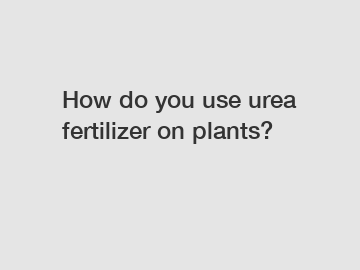How do you use urea fertilizer on plants?
How do you use urea fertilizer on plants?
Urea fertilizer plays a vital role in promoting healthy plant growth and enhancing crop yields. But how exactly should you use it to maximize its benefits? In this article, we will explore the various aspects of using urea fertilizer on plants and provide valuable insights on its application. From understanding the basics to ensuring proper dosage, we will cover it all. So, let's dive in!
1. What is urea fertilizer?

Urea fertilizer is a concentrated nitrogen-based fertilizer that consists of nitrogen in the form of urea. It is one of the most commonly used fertilizers worldwide, thanks to its high nitrogen content that fuels plant growth. When urea fertilizer is applied to the soil, it gets converted into ammonium, which is readily taken up by plants.
2. Why use urea fertilizer?
Nitrogen is an essential nutrient required by plants for their growth and development. Urea fertilizer provides plants with a readily available source of nitrogen, ensuring optimal growth and improving the overall yield. Moreover, nitrogen is a vital component of proteins, enzymes, and chlorophyll, all of which are essential for healthy plant functioning.
3. How to apply urea fertilizer?
To use urea fertilizer effectively on plants, it is crucial to follow proper application techniques. Here are some key points to consider:
a. Timing: Apply urea fertilizer during the active growing season of the plants, when they have a high demand for nitrogen. This is usually in the early stages of growth or before flowering occurs.
.
b. Soil moisture: It is important to ensure that the soil is moist before applying urea fertilizer. This enhances the fertilizer's uptake and minimizes nutrient loss through volatilization.
.
c. Precautions: Avoid applying urea fertilizer when heavy rain is expected shortly, as it can cause leaching and nutrient runoff. Additionally, urea should not be applied in drought conditions, as it requires adequate moisture to break down into plant-available forms.
.
d. Broadcasting vs. band application: Urea fertilizer can be broadcasted evenly across the soil surface or applied in bands near the plant roots. Broadcasting is suitable for large-scale field crops, whereas band application is best for row crops or when plants are spaced apart.
4. Dosage and frequency:
Determining the right dosage of urea fertilizer for your plants is crucial to prevent both under-fertilization and over-fertilization. Factors like crop type, soil fertility, and plant nutrient requirements must be considered. Conducting a soil test can help identify the nutrient levels and guide the appropriate application rate. Generally, a common recommendation is to apply 1-2 pounds of urea fertilizer per 1,000 square feet. For potted plants, a diluted urea solution can be used for regular feeding.
5. Nutrient loss prevention:
Urea fertilizer is susceptible to nutrient loss through volatilization, especially in warm and high-pH soils. To minimize this loss, urease inhibitors can be added to the fertilizer or the soil along with urea. These inhibitors slow down the enzyme action responsible for converting urea into ammonia, allowing the plant more time for nitrogen uptake.
In conclusion, urea fertilizer is an excellent choice for promoting plant growth and increasing crop yield. Understanding the proper application techniques, timing, and dosage is crucial to optimize its benefits. By following these guidelines and taking necessary precautions to prevent nutrient loss, you can ensure your plants receive the right amount of nitrogen for their healthy development. So, go ahead and harness the power of urea fertilizer to nurture your plants and achieve bountiful harvests.
Are you interested in learning more about granular nitrogen fertilizer, npk slow release fertilizer, npk soluble fertilizer? Contact us today to secure an expert consultation!

Comments
0